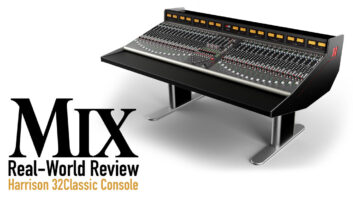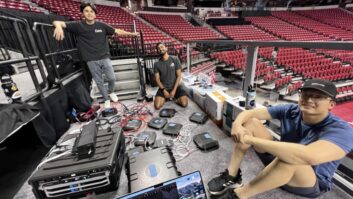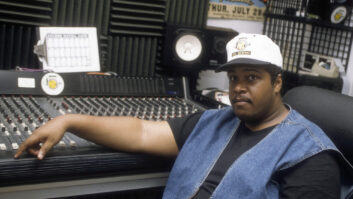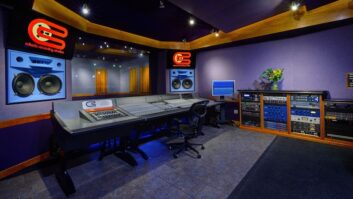In 1958, when Mack Emerman founded Criteria Recording Studios, it was the city’s first real recording studio. Emerman, who turns 75 this year, was born in Erie, Penn., and convinced his steel-selling father that he was attending Duke University for its business classes. “The real reason I went there was because Les Brown formed a big band, the Duke Ambassadors, there,” recalls Emerman, who played trumpet with Brown in that band. While Les Brown went into the musical pantheon with his Band of Renown, Emerman’s family migrated to the sunnier climes of south Florida in 1950, a landscape not changed all that much since the Marx Brothers’ 1929 Broadway comedy and film Coconuts lampooned land sales scams and snowbirding hoi polloi.
Emerman’s love of jazz prompted him to expand his record collection by making tapes of touring acts like Woody Herman. Emerman’s first recording rig included a Berlant Concertone tape recorder, which featured five heads and could record in mono or stereo, a favorite pair of Neumann U47 microphones and some homemade speakers, which he loaded in the back of his station wagon and took around to the various jazz clubs of Dade County. Emerman then turned the resulting tapes into discs, using the first cutting lathe ever seen in the county.
In 1955 Emerman formed a label, which he christened Criteria Records, and though that venture foundered, it did lead him into a professional modus operandi that would stand him well in the years to come. “I called it ‘studio-sneaking,'” he says. “I would go into other studios and see how they did it.” One such trip led him to the doorstep of famed jazz producer/engineer Rudy van Gelder, in suburban New Jersey. “He was my hero,” says Emerman, with the genuine sincerity that made friends of most of the studio owners he met this way. “Rudy came to the door in his bathrobe and told me to come on in. He had the first recording console I had ever seen. I saw a red light flashing on the board, and I asked him about it, and he said, ‘I’ll cut your masters for you, but I’m not giving you any engineering lessons!'”
In 1958, Emerman opened Criteria Recording Studios in a building on 149th Street in North Miami. The first studio was equipped with Ampex decks-3-track, stereo and mono-and a console built by Wimpy Hutchinson, then the chief engineer at the local NBC affiliate. A few people noticed some distortion in the sound of the garage-built console, and Emerman sought advice from the owner of a local hi-fi shop. That was Jeep Harned, who rebuilt the console and went on to found MCI, the first U.S. manufacturer of dedicated recording consoles and multitrack decks. All of Criteria’s studios would eventually be equipped with MCI technology, and the business relationship formed the basis of a lasting friendship, as well.
Criteria’s second studio was built in 1965, and the facility, which had been a favorite of regional musicians-including Jackie Gleason, who made a series of best-selling Music For Lovers records in the 1960s-quickly became a recording center for the burgeoning rock music industry. When Tom Dowd, a staff producer for Atlantic Records in New York, moved to Miami, the multiroom complex became a beehive of major record activity. Derek & The Dominoes’ Layla brought the studio acclaim, and The Bee Gees and The Eagles booked months at a time to write and record at Criteria. Emerman even bought a beach house, dubbed “Home At Last,” to house his rock clients. In the meantime, the studio became a launching pad for the careers of numerous producers and engineers, including brothers Ron and Howie Albert, and studio designer Ross Alexander, the facility’s first chief engineer.
Emerman was in it for the love of the music, but when things slowed down for Criteria-and the entire music industry-in the 1980s, love wasn’t enough when the bills were due. After struggling for the better part of the decade, Emerman sold the indebted studio in 1991. An arrangement to stay on after the sale went sour, and Emerman, at the age of 67, found himself without the occupation and interest that had driven him for the past 33 years. What followed was three years of illness, including the onset of diabetes, and a clinical depression so deep that he couldn’t even bring himself to answer the phone.
But things did turn around. The first glimmer of hope came in a strange and wonderful manner. His daughter had finally coaxed him to get a physical checkup. When the doctor examined Emerman’s ears, he found a wax buildup that was so deep the core of wax he drilled out was nearly two inches long. When the doctor spoke to him after the cleaning, Emerman was astounded at what he could now hear. “I’d been basically deaf for three years and didn’t realize it,” he says. “I went home, put on a pair of stereo headphones, listened to music for the first time in years. And I cried. I just bawled.”
He wasn’t out of the woods yet. A series of minor strokes that had gone undetected during the period had robbed him of some of his memory, and years of neglect had ravaged his health. It was his old friend Harned who stepped in. Now living in Durango, Colo., after selling MCI to Sony and continuing a winning business streak, Harned sent his private plane for Emerman, and under a regimen supervised by Harned’s wife, who had studied alternative medicines, Emerman was restored, physically and mentally. He now works out three times a week, and while some of his memories are lost forever, he is embarking on a new venture, with Ron and Howie Albert and 1960s-era singer and record producer Steve Alaimo: the expansion of their Miami studio Audio Vision from a private facility to a for-hire one, to meet the growing demand of Miami’s expanding music business.
“I made mistakes by not taking care of business better than I should have,” concedes Emerman, but without a trace of rancor. “And you can tell your readers that they had better watch theirs, too. You got to take care of the money so it can take care of you. But music is still something you do because you love it. Tell them to remember that, too.”







